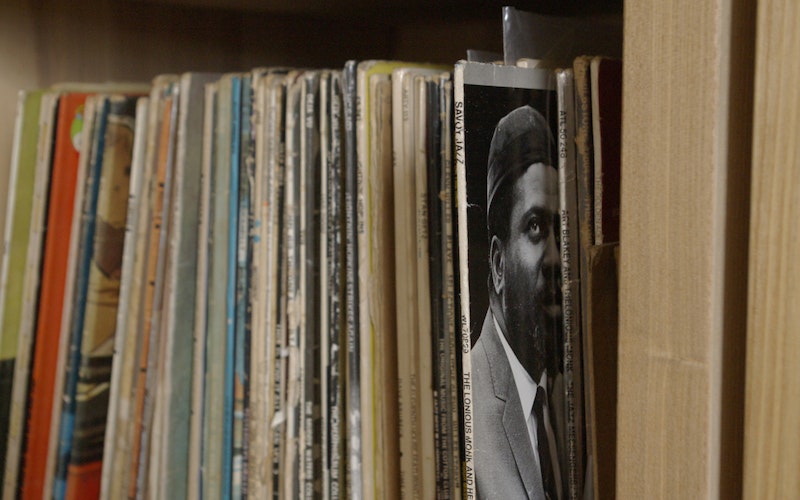
Off Minor Prophet: Thelonious Monk at 100
It’s hard to picture Thelonious Monk retiring quietly to his chambers to study holy texts by candlelight. This Monk defied his spiritual-sounding surname; the jazz pianist’s meditations were anything but silent. They were volcanic. You can sense a prayerful aspect in his playing, but only after the earth stops moving beneath your feet.
And yet, in another way, his playing was spiritual. Monk’s music had more in common with the prophets than the ascetics. If jazz had a high priest, someone to usher you into the divine, it was John Coltrane, with a mystic’s twinkle in his eye and his disarming musical wisdom. But if you need to get right with God, to find truth spoken to power—and with power—you go to Monk.
This has been a serious year for album anniversaries, from the Beatles’ Sgt. Pepper’s Lonely Hearts Club Band to U2’s The Joshua Tree. But arguably the year's biggest musical milestone is the 100th anniversary of Monk's birth in Rocky Mount, N.C.
Long before Paul Simon read the words of the prophets on subway walls and in tenement halls, Monk was capturing what the prophets sounded like, using all 88 keys. There are echoes of Old Testament seers in his tone and timbre. With thick chords and rhythmic eruptions, Monk imitates Elijah calling down fire at Mount Carmel and reminds us God is in the whirlwind and the storm. Joining gravity and beauty, Monk can sound as if he’s beating swords into plowshares and spears into pruning hooks. At times, the petulance in his playing calls back to the reluctant prophet Jonah.
When Monk’s music woos, he sounds like Hosea begging Gomer, “Baby, won’t you please come home?” In more nimble, danceable passages, he reminds us of the beautiful feet that bring good news and tunes our ears to how God sings over his children.
Of course, Monk didn’t do this in so many words. There was no intentional imitation on his part; he didn’t take his cues directly from the Holy Spirit. But by being himself and enjoying the blessing of God’s common grace, he tapped into the depth of feeling we find in the prophets.
If you need to get right with God, you go to Monk.
We need each and every one of the prophets to build our picture of the Old Testament God and to point to the coming of his Son. If we only had one prophet to read, we might think God was only one way. But in their full counsel, we bear witness to a God who is fully realized and completely balanced. Listening to Monk is like reading the prophets start to finish in one sitting. We are thrown off our axis by the full range of emotions.
The true test of a prophet, however, is not how much fire he can breathe or the beauty of his exhortations. Accuracy and virtue count. Does his message hold holy water? Is it good for God’s people for once and for always?
This is why Paul told the Thessalonians, “Do not treat prophecies with contempt but test them all; hold on to what is good...” As we seek to understand a Scriptural prophecy or passage, a simple, two-part hermeneutic serves us well. We should first ask: what was this meant to say to its original audience? And then: how does it encourage us toward faith and good works today?
A century after Monk was born, what do we hear that rings true across his life, into ours, and will spill into future generations?
Coming into their own in the 1940s, Monk and his fellow bebop evangelists found that although jazz was subversive, it didn’t necessarily sound like it anymore. As Carvell Wallace noted at Pitchfork, jazz’s rough edges had been sanded down for the sake of wider appeal.
With their music, Monk and his peers reinforced something that’s fundamental but often neglected: the truth isn’t always pretty. “They wanted to play music that expressed how life actually felt,” Wallace wrote. “Angry, complex. Tragicomic. Emotionally full. ...They began to experiment with densely layered chords, stacked high like the levels of a skyscraper: 9ths, 11ths, 13ths, 15ths. Dissonance buried like gems within pockets of harmony. ...A feeling that things were slightly off. Asymmetrical melodies that started off one way but didn’t resolve themselves. Didn’t assure the listener that everything was all right.”
Staring down those realities, fighting the temptation to blink, we get a truer picture of ourselves. And that unclouded view gets us a little closer to seeing our need for God.
There are, of course, differences between Monk and the prophets. The urgency in his playing didn’t carry the same weight or desperation as one who speaks for God himself. What’s more, it’s hard to put on a tune like “Raise Four” and not hear him as a mocker, someone ultimately outside God’s purposes looking in, yet able to be swept up and used by God anyhow.
Monk didn’t have a direct line to the Almighty. But he was listening for, then repeating, signs of a difficult life and strains of saving grace. Wallace doesn’t exactly use prophetic language in his Pitchfork piece, but he wrote that Monk’s “life work” was to “open a portal into the bedraggled contradictions and breathless off-tempo grind of being black in America.” Like Jeremiah or Hosea, Monk lived an amplified version of his message. That existence, and the music fashioned from it, gives him a staying power only the prophets can surpass.
Topics: